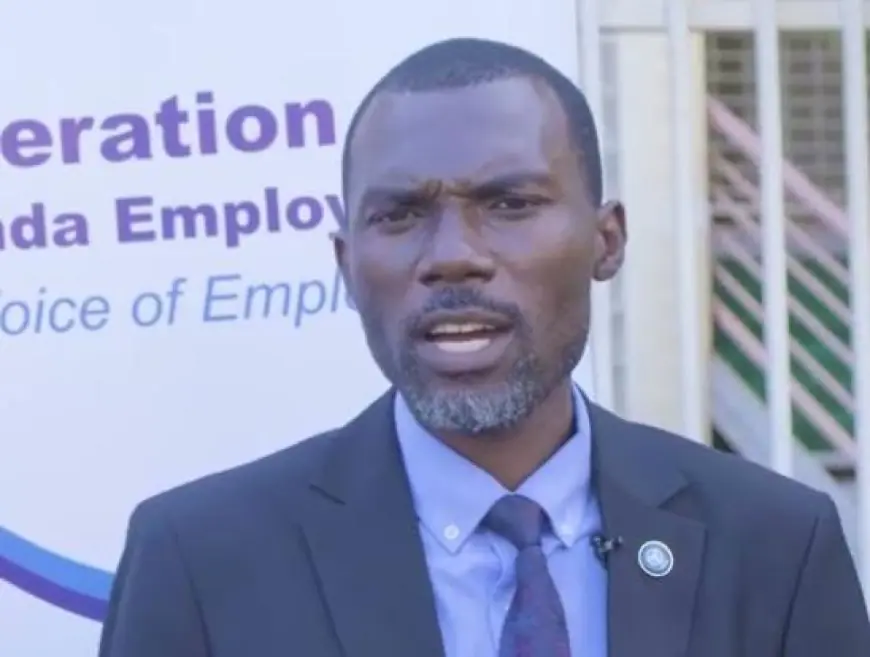Federation of Uganda Employers to establish a National Productivity Center to enhance the value of workers.

The Federation of Uganda Employers (FUE) the only organization that acts as a voice for workers is in the advanced stages of setting up a national productivity center to ensure that the value added per work is enhanced through employer-led skills development, engaging key industry players among others.
According to the CEO of FUE, Mr. Douglas Opio, the productivity center will be pivotal in improving the revenue for Uganda’s workforce with various partners.
“The National Productivity Center will be set to ensure Uganda's workforce has improved value per work. We want a higher value for work to improve revenue. We have presented proposals to the cabinet. We hope by next year we will be set” he said.
The CEO revealed this while briefing the media on Wednesday, December 18th, 2024, at Hotel Africana on updates about the journey in 2024 and what they intend to do in 2025.
He mentioned that through 2024, among the activities undertaken by FUE includes engaging with employers and stakeholders under the VOKA initiative to bring the attention of employers on various issues affecting the industry such as leveraging AI digital tools to improve work, training of employees, inclusivity, investment promotion, mental health, financial literacy among other issues.
Mr. Opio said that FUE will continue to focus on amplifying the use of technology to improve the productivity of the workforce, especially through the use of AI tools and supporting young people from training institutions to prepare them for the world of work through funding a percentage of their wages in case employers have financial challenges in areas including the Rwenzori, Albertine, Mukono among others.
“We want to support over 300 young people financially in our areas of operation by paying 80% of their wage for 6 months. We are talking to our partners like GIZ” he said
Meanwhile, FUE from a reliable source earlier convened a stakeholders’ workshop in Kampala to explore solutions to labor issues and the rights of “gig” workers in Uganda. The workshop, themed The Gig Economy and Labour Rights, brought together various stakeholders to discuss the challenges and opportunities facing the country’s rapidly expanding digital economy.
The gig economy is an emerging labor market characterized by short-term contracts or freelance work, such as that of SafeBoda riders, Uber drivers, and Jumia delivery personnel. These workers often lack traditional employment benefits, such as minimum wage, overtime pay, or workers' compensation, creating significant challenges for the protection of their rights.
The workshop focused on the need for comprehensive policies that protect the rights of gig workers and support the sustainable growth of Uganda's digital economy. This aligns with the FUE’s mission to influence policy, promote decent work, and engage stakeholders in coordinated efforts to address labor rights issues that limit participation in Uganda’s digital economy, particularly for marginalized groups.
Addressing the attendees, the CEO of the Federation of Uganda Employers, Mr. Douglas Opiyo, emphasized that the workshop was a continuation of previous efforts to find practical solutions for addressing challenges faced by digital workers.
He underscored the importance of using Information and Communication Technology (ICT) to tackle these issues and revealed plans to launch a digital platform by April 2025 to facilitate stakeholder interaction and collaboration.
Opiyo also highlighted the importance of supporting the creation of new jobs and helping young people acquire the skills necessary to remain innovative and productive in a digital-driven economy.
FUE works in collaboration with the Ministry of Gender, Labour and Social Development, National Organisation of Trade Unions (NOTU) and Central Organisation of Free Trade Unions, Uganda (COFTU), they have over 694 members across different sectors, in the government, Private Sector, NGOs and sectoral organizations.












